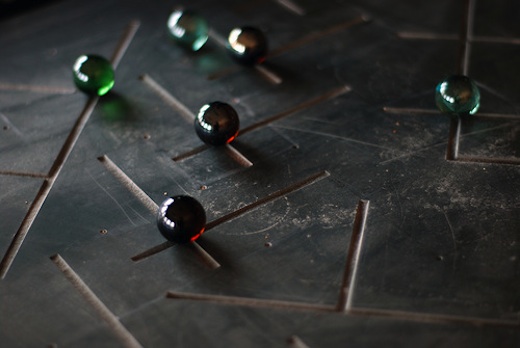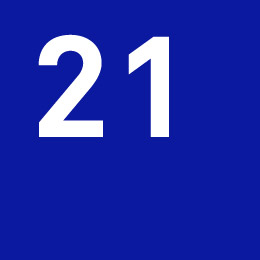
Molti sono i punti a favore de Mathias Delplanque all’analisi ravvicinata del sua nuovo album “Passeportsâ€. Innanzittuo l’autore francese appare assai abile nella documentazione e nell’elaborazione dei materiali che costituiscono la struttura portante per i sette segmenti dell’album (si tratta di registrazioni sul campo relative all’ambito del trasporto: stazioni, porti, parcheggi e altre zone di transito, reali o metaforiche, come nel caso dei reperti intercettati in un call center di Nuova Delhi dal quale scaturiscono più che altro movimenti di parole ed emozioni). Inoltre l’impiego di tali materiali non risulta mai gratuito perché sempre in funzione di una narrazione, così il suono porta con sé memoria e memorie dei luoghi, un’anima, una storia, una suggestione magari fugace ma intensa. Robusta la massa ambient in cui tutto ciò viene racchiuso amalgamata da Delplanque in crescendo d’impatto quasi orchestral-sinfonico. (8/9) Nicola Catalano
Drumming present a new work by @c

Next Sunday, November 7th, at Teatro Aveirense, the Drumming Percussion Group presents a program of contemporary percussion works that includes the premiere of “88†a new work for percussion commissioned to @c (Pedro Tudela & Miguel Carvalhais).
More information at Festivais de Outono or Teatro Aveirense.
Futurónica #21

Episode 21 of Futurónica, a broadcast in Rádio Zero (every two weeks, on Friday nights, repeating on Tuesdays at 01h) airs tomorrow, November 5th at 21h (GMT).
The playlist for Futurónica #21 is:
- David Maranha, Berceuse pour Ema (2006, Atlantic Waves)
- Osso Exótico, Ciclo #2 (1997, V, Ananana)
- Osso Exótico, Untitled (1999, VII, Drone Records)
- David Maranha, Redemption Torture (2007, Marches of the New World, Grain of Sound)
- Osso Exótico, Untitled (Marvila Church organ) (1997, VI: Church Organ Works, Sonoris)
- Osso Exótico + Z’EV (2007, Crouton)
You can hear Rádio Zero’s broadcasts at radiozero.pt/ouvir.
Marc Behrens and Paulo Raposo present a tribute to JG Ballard
Friday, November 5th, at the Serralves auditorium in Porto, Marc Behrens and Paulo Raposo present two performances inspired on, or dedicated to JG Ballard.
More information at Serralves’ website.
“Crónica L†reviewed by Loop

Este compilado celebra la edición número 50 del sello de Porto, Portugal, dirigido por Miguel Carvalhais and Pedro Tudela, quienes invitaron a 18 artistas del sello para que colaboraran entre ellos porduciendo nueve temas. La primera pista es por el italiano Enrico Coniglio y el artista sonoro británico Janek Shaefer que es una pieza de drone junto a una percusión de objetos encontrados. El artista francés Gilles Aubry y el portugués Paul Raposo exploran sonoridades abstractas cercanas al ruido; en tanto que el alemán Marc Behrens y Cem Güney empujan las barreras de la electroacústica. Los portugueses Portuguese @c + Gintas K producen agudos tonos bastante oscuros. El austrÃaco Peter Votava aka Pure y el portugués Durán Vásquez en “STROORM†trabajan con micro sonidos casi al borde del silencio pero súbitamente se transforma en ruido. Stephan Mathieu y Piotr Kurek muestran un tema de drone texturizado con registros de campo. El artista israelà Ran Slavin + el portugués Vitor Joaquim en “Voices Over Water†también utiliza grabaciones de cantos y como fondo hay una percusión en la lÃnea de Muslimgauze. Lawrence English residente en Brisbane, Australia y jefe del magnÃfico sello Room40 y Stephan Vitiello entregan tonos destellantes, sonidos de moog junto a grabaciones de cantos de distintas aves. Cerrando el compilado el portugués The Beautiful Schizophonic y TU M’ producen una bella pieza de ambient. Indudablemente que este disco resume el incansable esfuerzo de un sello que desea mostrar música de avanzada de calidad.
via Loop
Crónica releases are now available at various online stores

Several Crónica disc releases are now available through various online stores, besides Boomkat, through which store we have been distributing our releases for the last couple of years.
You can currently find most of the latest releases available for purchase and download through outlets as iTunes, Amazon, emusic, Fnac, Napster, Juno, among others. Nicolas Bernier’s “strings.linesâ€, Mathias Delplanque’s “Passeportsâ€, Marc Behrens’s “Sleppetâ€, The Beautiful Schizophonic’s “Erotikonâ€, Piotr Kurek’s “Lecturesâ€, Gintas K’s “Lovely Banalitiesâ€, Pure’s “Ificationâ€, Gilles Aubry’s “Berlin Backyardsâ€, Cem Güney’s “Praxis†and @c’s “Up, Down, Charm, Strange, Top, Bottom†are among the releases that are already available. More will follow as the entire back catalogue of Crónica is uploaded.
Nicolas Bernier releases “courant.air†in ahornfelder

courant.air is the continuation of the work begun in 2007 with the guitarist Simon Trottier in which we intertwine improvised electroacoustic and folk music. I wanted to explore this further within a formal compositional context. I imagine myself on the banks of the St. Lawrence river, this estuary to which I owe the history of my country. I look backwards, in direction of its landscapes created by erosion caused by wind and water.
More information at ahornfelder.
“Crónica L†reviewed by Textura

Crónica celebrates its fiftieth release with a compilation featuring nine collaborations by Stephan Mathieu, Janek Schaefer, Lawrence English, Marc Behrens, Stephen Vitiello, Tu M’, and others. Crónica L’s material is emblematic of the type of bold experimentalism the label has remained faithful to since its inception more than seven years ago. It’s an hour of challenging yet engrossing listening packed with microtextural soundscapes and granular drones that should appeal to devotees of Francisco López and electronic producers of kindred sensibility. Throughout the recording, ever-mutating sounds flutter hyperactively in convulsive settings of resolutely abstract character.
In “Unfurling Fugue,†Janek Schaefer weaves Enrico Coniglio’s Venice-based field recordings into a combustible melange of clattering noises and organ tones. Gilles Aubry and Paulo Raposo give us nearly ten minutes of restlessly churning industrial dronescaping in “Forms of Suspension.†@c (Pedro Tudela and Miguel Carvalhais) and Gintas K conjure a dizzying storm in “K./85†of rabid insectoid chirp and rumble, with all of it laced with swirling shards of acoustic guitar flutter. Stephan Mathieu and Piotr Kurek generate a deeply crackling drone of voice fragments and electronic slivers (“The Heavens Have Many Colorsâ€), while the plaintive ululations of a Middle Eastern singer shadow a turbulent churn of industrial noise in Ran Slavin and Vitor Joaquim’s “Voices Over Water.†“Circles of Twine†finds Lawrence English and Stephen Vitiello weaving outdoors field recordings and piano playing into a dense field of reverberant haze, after which “Rêve General,†perhaps the album’s peak moment, takes the recording out on a celestial cloud of blinding tones and washes, courtesy of The Beautiful Schizophonic (Jorge Mantas) and Tu M’ (Rossano Polidoro, Emiliano Romanelli). Despite the involvement of eighteen different artists, the collection turns out to be surprisingly cohesive with each of the nine pieces complementing one another by spinning fully developed variations on the dronescaping style. On this collection, Crónica re-affirms its reputation as a label of integrity that regularly offers free-to-download recordings to its listeners and is more than a little deserving of whatever support the electronic music listening community can provide.
“Lectures†reviewed by MII

Piotr Kurek – poÅ‚owa breakcore’owej formacji Åšlepcy, znanej w drugiej poÅ‚owie lat 90.ukazuje na tej pÅ‚ycie swoje inne oblicze. Od października do grudnia 2007 r.odbywaÅ‚ siÄ™ w Warszawie festiwal Zakrzywienia IgÅ‚y, skÅ‚adajÄ…cy siÄ™ z trzech osobnych bloków. Jeden z nich byÅ‚ poÅ›wiÄ™cony twórczoÅ›ci Corneliusa Cardew -asystenta Stockhausena, zaÅ‚ożyciela AMM i Scratch Orchestra, klasyka notacji graficznych od poczÄ…tku lat 70. poÅ›wiÄ™conego muzyce rewolucyjnej (m.in. sÅ‚ynny esej Stockhausen Serves Imperialism). UdziaÅ‚ Kurka w tym wydarzeniu w roli jednego z wykonawców przyniósÅ‚ rezultat w postaci recenzowanej tu pÅ‚yty, na której autor poddaje dekonstrukcjom i rekonstrukcjom nagrania Cardew udostÄ™pnione mu przez rodzinÄ™ kompozytora. Sample z taÅ›m, nagrania wykonaÅ„ i fragmenty wykÅ‚adów zostaÅ‚y komputerowo poukÅ‚adane na nowo. Kurek dograÅ‚ też niektóre partie wÅ‚asnorÄ™cznie.PowstaÅ‚ z tego, jak to okreÅ›la: „prywatny tributeâ€. Nie wiem jak daleko poszÅ‚y jego ingerencje, ale tak czy inaczej, sÅ‚ucha siÄ™ tego bardzo dobrze. Jako, że sam Cardew zmarÅ‚ 13.12.1981 (tak!) to i nagrania nie sÄ… wyjÄ…tkowej jakoÅ›ci. CzÄ™sto dokonywano ich podczas warsztatów i wykÅ‚adów co przydaje materiaÅ‚owi trochÄ™ przykurzonego smaczku. Tu i ówdzie sÅ‚ychać samego Cardew prowadzÄ…cego wykÅ‚ady, co z kolei przydaje pÅ‚ycie dokumentalnego sznytu -ale jak tribute to tribute. Z jednej strony to materiaÅ‚ wymagajÄ…cy od sÅ‚uchacza skupienia, miejscami wystawiajÄ…cy jego cierpliwość na próbÄ™, a jednoczeÅ›nie jest w nim pewna lekkość. Mimo skomplikowania muzycznej materii nie przytÅ‚acza, mimo aspektu mocno archiwalnego nie nudzi. I wcale nie trzeba znać teorii muzycznych Cardewa by znaleźć w niej satysfakcjÄ™.Godne polecenia.DK
“Crónica L†reviewed by Monsieur Délire

The Portugese label Crónica is celebrating its 50th release with a beautiful compilation album. Nine collaborations between 18 of the label’s key artists, 18 artists all illustrating in their own way the label’s aesthetics of sound experimentation and redefinition of the act of listening. I would point out the collaborations between Gilles Aubry and Paulo Raposo, Marc Behrens and Cem Güney, Lawrence English and Stephen Vitiello, and The Beatiful Schizophonic and Tu M’, but everything here is at least interesting, and many tracks are intriguing or downright beautiful.
via Monsieur Délire
